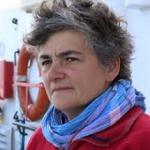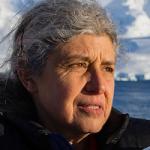The impact of climate change on Greenland's glacial fjords, ecosystems, and local communities
Navigating the New Arctic (NNA) is one of NSF's 10 Big Ideas. NNA projects address convergence scientific challenges in the rapidly changing Arctic. The Arctic research is needed to inform the economy, security and resilience of the Nation, the larger region and the globe. NNA empowers new research partnerships from local to international scales, diversifies the next generation of Arctic researchers, and integrates the co-production of knowledge. This award fulfills part of that aim.
Hundreds of glaciers around the Arctic flow into ocean fjords that are several miles wide, tens of miles long, and thousands of feet deep. Glacial meltwater and sediments released into the fjords make their waters nutrient-rich to the extent that glacial fjords, all over the Arctic region, are characterized by prosperous marine ecosystems, featuring a high density of seabirds, marine mammals, and fishes. As a result, many Arctic settlements are located near glacial fjords that, through their ecosystems, support hunting and fishing and contribute to the regional economy. As the Arctic warms, however, glaciers are melting and retreating, and ocean waters are expected to warm, thus affecting these glacial fjord ecosystems and the human communities they support. Within this project, researchers will take advantage of new projections of how the glaciers and the ocean will change, combined with improved understanding of glacial fjords and their ecosystems, to investigate change at two distinct glacial fjords in Greenland. The long-term goal of this project is to provide relevant planning information to the two communities in Greenland and develop a method that can be applied to other communities around the Arctic.
The international research team, composed of glaciologists, oceanographers, marine ecosystem scientists, and social scientists, will use available data and hold discussions with community members to identify the relevant socioecological system components and linkages for two glacial fjord systems, one in Northwest Greenland and one in Southeast Greenland. This systems understanding will be combined with glacier and local climate (ocean and atmosphere) projections to determine how climate projections can be optimally utilized for sustainable planning and adaptation. This research will involve synthesis of existing information and co-production of knowledge with the two communities. A final workshop involving Greenland Government officials and other Arctic organizations will be used to develop a framework that can be applied throughout the Arctic.
This award reflects NSF's statutory mission and has been deemed worthy of support through evaluation using the Foundation's intellectual merit and broader impacts review criteria.
This planning collaboration between Straneo (1928007, LEAD, UCSD), Little (1927990, AER) and Laidre (1927722, UW) will develop a framework to project future changes in the social-ecological system for two indigenous communities in Greenland that rely heavily on subsistence hunting and fishing: Qaanaaq, in northwest Greenland, and Tasiilaq, in southeast Greenland. Plans for workshops in Nuuk in March and travel to two communities in Greenland in summer to initiate collaborations with local communities have been affected by travel restrictions related to COVID-19. In the end, Straneo was able to carry out a trip to Greenland in summer 2021 which led to meeting with people in Nuuk and Tasiilaq.
Co-Principal Investigators
Publications
Project Outcomes
NSF Award #1927722 & #1927990
In this planning project, a diverse team of physical and social scientists, in consultation with Greenlandic scientists and community members, identified strategies to study how large scale climate variability impacts two "glacier-fjord systems" -- defined to include the glacier, fjord, coastal region, marine ecosystem, and local inhabitants. The two target systems -- near Tasiilaq and Qaanaaq, Greenland -- possess rich, productive marine ecosystems which, in turn, provide natural resources (including fish and marine mammals) to the communities.
Preliminary analyses of historical physical climate, biological productivity, fisheries, and social dynamics were documented in a comprehensive report and a paper in Oceanography Magazine. Analysis of historical data and climate projections showed that observed modern-day climate changes (glacier retreat, sea-ice decrease, rising air temperatures) are not unprecedented over the last century but that they will emerge from the range of human experience within the next 20-30 years. Through NSF-sponsored meetings and one-on-one interactions, the project team learned from the experiences of several other NNA projects. Team members also interacted with a wide range of Greenlandic organizations and potential collaborators including the Greenland Institute of Natural Resources, Asiaq (the Greenlandic geophysical survey), Oceans North, and fisheries experts.
These activities, and relevant findings, were used to develop a successful follow-on, 5-year duration, NNA proposal (work begins in 2022) that includes additional social and fisheries scientists, both US- and Greenland-based. Planned activities in the follow-on project include: additional analysis and integration of existing and historical data; social science archival research; field measurements to inform understanding of processes, system interdependencies and relationships across spatiotemporal scales; and identification of likely system trajectories based on climate model projections and system understanding. Studies of the natural environment will be integrated into a detailed comparative analysis of the interplay of climatic, ecosystem, and societal forces at the local and national level.
NSF Award #1928007
Greenland's coastal margins are regions characterized by the circulation of Atlantic and Arctic Ocean waters; the discharge of icebergs, meltwater, and sediments from the ice sheet; the formation, melt, and transit of sea ice; and the battering of extreme storms and katabatic winds. Hundreds of narrow glacial fjords, some several thousands of feet deep, incise the coastline and connect the ice sheet to the ocean. In these fjords and in the adjacent coastal region, the interaction of ocean currents, glaciers, and winds gives rise to nutrient-rich waters and conditions that support rich marine ecosystems, featuring a high density of seabirds, marine mammals, and fish (see Figure). These thriving ecosystems, in turn, support local people and communities, whose sustenance, livelihoods, and culture have adapted to these dynamic conditions.
Climate change, and the associated pronounced warming of the Arctic region, however, is now driving rapid retreat of glaciers, an increase in surface melt over the ice sheet, a shortened sea-ice season, rising air temperatures, and a meridional migration of species. Understanding how these changes will impact this coastal region is key to informing adaptive strategies for local residents. Equally important is evaluating how the present and projected variability compares to that of the past historical record including the collective, historical memory of the inhabitants.
In this project, oceanographers, glaciologists, fisheries experts, climate modelers, an environmental historian and several Greenland scientists worked to describe the system of interacting components at Greenland's margins. We investigated past change (from historical data over the last century) and future projections from climate models for two contrasting regions, one in the Atlantic sector and one in the Arctic sector of Greenland. We found that while both regions have experienced a warm period in the 1930-1940s that is similar to the current warming, by the middle of the 21st century the warming of the atmosphere and changes in the ice will be beyond anything experienced over the last 100-150 years. Next we identified the steps needed to determine how the coastal system (including the marine ecosystem), and the services it provides to communities both locally and globally, will evolve in the future. This work is summarized in a report that is publicly available, in a paper that was submitted for publication, and the results were shared with Greenland partners in a visit to the capital, Nuuk, in summer 2021. It also laid the foundations for a follow up study to address the system evolution that was submitted as a follow up Implementation Grant for this same NSF Program.



